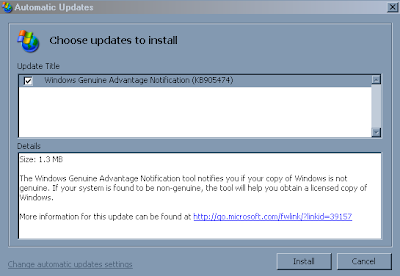
When I turned on my computer today, I noticed the "Yellow Shield of Protection" on display at the bottom right hand corner of my screen. You know, the "Updates are ready for your computer" message where you usually just click through. And why not click through, it's not like you would run into any problems. Right?
Well, I clicked to open and instead of blindly clicking through, I decided to review what would be installed. I found the following "tool" was going to be installed:

It's a Windows Genuine Advantage Notification tool installation. Now, I'll give Microsoft the benefit of the doubt. They are really trying to get people to buy a real copy of Windows. After all, they are a business. The problem comes into play when this tool installs and then tells you your copy of Windows has been compromised, similar to the situation I had when I tried to reinstall my copy of Windows XP on my laptop (even though the Product Key was stuck to the bottom of it). Then that person will have to jump through hoops to fix the issue. All this tool really does is hurt consumers who really did pay to get the software. Those who got a copy without paying have already figured out how to get around this system. How do you think they installed it in the first place?
Needless to say, I'm not installing the tool right now until I can review the patch later. If I do run into problems, I don't want the hassle right now and I'm just not prepared to switch over all my PC's to Linux, yet...

